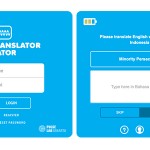 The idea of using the crowd to help with language learning is a well established one, with sites like Duolingo leading the way with their Captcha based service that recruits people to translate documents whilst learning a new language.
The idea of using the crowd to help with language learning is a well established one, with sites like Duolingo leading the way with their Captcha based service that recruits people to translate documents whilst learning a new language.
Recently an Indonesian organization have launched a new game, called Translator Gator, that aims to support research initiatives in the country.
Gamifying translation
Players are rewarded with phone credit when they translate words between English and one of the six commonly used Indonesian languages.
The database of words generated by the game will then be used by researchers on a range of topics, from computational science to public policy.
The ultimate aim of the project is to help integrate the 17 Sustainable Development Goals into the Indonesian government’s current program, with the translation effort hoping to raise awareness of them.
A standard taxonomy
The researchers hope to encourage feedback from users by developing a standard taxonomy that will be categorized by topic or government priority.
Traditionally this has been enormously challenging given the linguistic and cultural diversity in Indonesia that represents a significant translation piece.
When you add in the various slang and jargon that is used, especially on social media, and the size of the task escalates.
The game will enable the creation of a dictionary of translations that will then support various academic and social projects in Indonesia. It will translate English keywords into not only Indonesian but the numerous other local languages used in the country.
The game has four key components:
- A translation SDG – this will contain the words/phrases in defined English and their translation into the commonly used Indonesian languages
- Evaluate – this function will perform the evaluation of translations submitted by players to validate their meaning
- Alternatives – a synonym will be suggested if necsssary
- Classification – the words and phrases will then be classified into categories that are outlined in the game
Players will earn points throughout the game by working in each of these four areas, with the points redeemed for phone credits.
It’s an interesting example of how socially valuable tasks can be broken down and performed by the crowd via a game based environment.